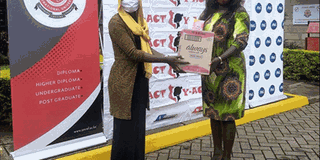Menstrual health, a human rights issue

Superb founder Ms Yasmin Nassur (left) receives sanitary towels from Ms Editar Ochieng of Feminist for Peace Rights and Justice Center. a Kibra community based organisation The event took place at Amref International University grounds on April 23,2020 .Ms Nassur's organisation is one of the youth networks that Amref Health Africa will be using to distribute 16,000 sanitary towels to 5,333 vulnerable girls and women in Nairobi,Kilifi,Samburu and Kisumu.Procter and Gamble donated the pads to Amref Health Africa on April 23 through its Youth in Action(Y-ACT) network. Superb,Ms Nassur’s organisation is in the network.
When Ms Yasmin Nassur became an adolescent, something about her changed - she started receiving her monthly periods. Having been raised by a grandmother in Kibra slums, Nairobi County among a dozen other grandchildren, a sanitary towel was a luxury.
Ms Yasmin lost her mother at the age of nine, leaving her under the care of her grandmother. Any money the old woman earned from her micro-business, was precisely for the most important basics like water, food, shelter and clothes. A pad was an extra expense she could not afford.
“I used to do clothes and old rags. At some point, I got an infection because of using unsanitary materials,” says Ms Nassur.
Luckily in 2004, a Kibra-based organisation recruited her into a sexual and reproductive health program. The organisation was a saving grace for her. Apart from equipping her with information on menstrual hygiene and health, it supplied her with the pads.
She was attached to a mentor who taught her how to keep safe and empower herself to become a resourceful person in the community.
So when she graduated from the program in 2014, she vowed to “reach out to other vulnerable girls and young women, and walk with them just like my mentor did.”
True to that, ‘Superb’ came to be.
She founded the community-based organisation in 2018, with a focus on girls and young women.
It targets only those living in Kibra. Ms Nassur empowers them with information on menstruation and supplies them with sanitary towels.
“Superb is an acronym based on our objectives. ‘S’ stands for Safe space. We are trying to create a safe space for Underserved communities, making them to be Persistent and Empowered. To create Resilience. And for them to be Bold and courageous and have positive energy.”
Sanitary towels
Her organisation is one of the youth networks Amref Health Africa will use to distribute 16,000 sanitary towels to 5,333 vulnerable girls and women in Nairobi, Kilifi, Samburu and Kisumu.
Procter and Gamble donated the pads to Amref Health Africa on April 23, through its Youth in Action (Y-ACT) network. Superb, Ms Nassur’s organisation is in the network.
“Covid-19 exposes girls and young mothers to harsh economic conditions, thus the donation will go a long way in saving them from transactional sex to procure the pads,” she says.
Each girl or young mother would receive three packets of the pads. Although she says every girl in the slums is vulnerable, for now she will give priority to the most vulnerable.
“Households with four girls menstruating, single parent families, orphans, child headed families and school going children,” she explains.
Ms Mette Kinoti, Group Programmes Director at Amref Health Africa says the pads would enable the girls and women whose social-economic risks have been heightened by Covid-19, maintain their dignity.
With closure of businesses, restricted movements and fear of infections, most women in informal settlements have suffered a great deal. They eke a living from doing domestic work, hawking merchandise and fast ready-to-eat food. They have either lost their incomes, or business is down. Any extra shilling they have is preserved for food.
Girls’ essentials such as sanitary towels, soap and underwear are rarely remembered in the midst of the prevailing difficult situation.
Unesco estimates that 2.6 million girls in Kenya require support to obtain menstrual hygiene materials. It further states that out of this, about 300,000 girls mainly living in the arid and semi-arid areas, would require both sanitary towels and underwear.
Ms Kinoti says the pads would “bridge the gap between vulnerable communities and offer better healthcare during this time of the pandemic.”
“The issue of women and girls being able to manage their menstrual cycle with dignity is a human rights issue,” she says.





